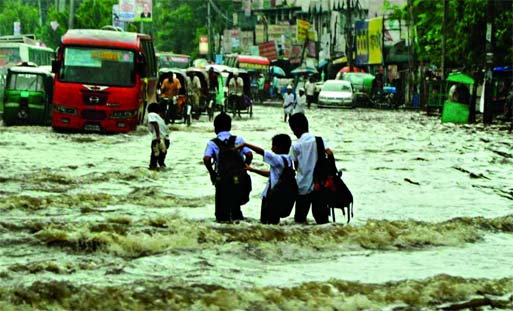
With the arrival of seasonal monsoon, heavy to very heavy downpour is continuing over the country for the last couple of days, severely disrupting public life in the port city Chittagong and also in capital city Dhaka.
Due to strong monsoon over the North Bay, deep convection has been created over the North Bay, adjoining coastal areas of Bangladesh and the maritime ports. Under its influence, squally weather may also continue over the areas, said a Met office bulletin here yesterday.
Meanwhile, the Chittagong city remained inundated for the fourth consecutive day on Monday, with a handful of vehicles plying on the streets.
Because of incessant rainfall, people have undergone enormous miseries particularly in the capital and in the port city. Commuters mostly school and office goers in Dhaka faced problems in reaching their respective destinations in the morning due to huge traffic jam triggered by the torrential rains that actually started from Friday.
The different parts of the capital, including Baridhara, Sukrabad, Paschim Rajabazar, Green Road, Paschim Testuri Bazar and Tollabag, were hit hard by the torrential rains on Monday.
The traffic in the city was in great chaos and the normal life in disarray as many streets went under knee-deep waters. Vehicles were seen moving slowly on the streets due to the rain, creating huge traffic congestions in the city.
The streets in areas like Shanir Akhra, Demra-Beribadh, Shahjahanpur, Shantinagar, Malibagh, Nayapaltan, Motijheel, Rajarbagh, Rampura and Badda were affected badly because of poor sewerage system. Tailbacks were reported from many city points, including Malibagh, Shantinagar, Mouchak Moghbazar, Mohakhali, Shahbagh, Gulistan, Mirpur Road and Rokeya Sharani as the clogged drains failed to flush out the rain waters.
Many commuters complained that rickshaws and CNG-run auto-rickshaw drivers charged them excessive fares, taking advantage of the rain-hit roads. The manholes or potholes added to the sufferings as vehicles and pedestrians stumbled on them and fell in the water.
The non-stop rain also prompted the government to issue a warning about the possibility of landslides in the hilly regions of Chittagong and Sylhet divisions.
The maritime ports of Chittagong, Cox’s Bazar, Mongla and Payra have been advised to keep hoisted local cautionary signal No. 3.
All fishing boats and trawlers over the North Bay have also been advised to remain close to the coast and proceed with caution till further notice. The maximum rainfall of 321 mms was recorded in Sandwip while 14 mms of rainfall was recorded in Dhaka in the last 24 hours till in the evening, according to Bangladesh Meteorological Department. Our Chittagong Bureau adds: The three-fourths of the Chittagong city, particularly the low-lying areas, went under waist to chest deep water following incessant rains for last four days. The sufferings of the city dwellers increased manifold as the extent of inundation was much higher than previous times that means water-logging broke the record of last 24 years.
The city’s low-lying areas like Bahaddarhat, Bakalia, Oxygen,Hamzar Bagh, Muradpur, Aturar Depot, Mohra, Chandgaon, Katalgonj, Chawkbazar, Rajakhali, Dewanbazar, Chandanpura, Doublemooring, Chotopool, Boropool, Pahartali, Saraipara, Sagarika, Patenga, posh commercial hub Chaktai, prestigious Jamal Khan, Nasirabad, Fireenghi Bazar, Majhir ghat and Sholokbohor areas were inundated from waist to chest deep water.
A resident of CDA residential area Dr. Selina Hira Chowdhury, expressing her anguish told The New Nation that she, for the first time, experienced the scene of entering water through the windows after 1991 devastating cyclone and tidal bore.
Movement of the pedestrians came to a halt as all sorts of vehicles went off the roads. Supply of electricity was suspended in most of the areas even for half a day. The dwellers this time faced untold sufferings as flood waters engulfed houses, shops and educational institutions. Their belongings have been damaged more or less. A good number of people failed to cook their meal as kitchen was out of order. As a result, they had to rush to the hotels. The sufferings of the poor section, including rickshaw pullers and day labourers were very much painful as their shanties were submerged.
Incident of land erosion was also happened at Tigerpass and Prabartak more area due to incessant rains. The district administration conducted a drive to shift the hillside risky dwellers to safer places. Hundreds of such inhabitants have already been shifted.
The conscious section of the society observed that in the backdrop of this alarming situation, the concerned authorities should take more pragmatic measures to rid the masses of this age-old curse water-logging. At the same time, they opined that the city dwellers should also carry out their civic responsibilities at the highest level. Dropping of garbage in the canals and other water outlets, no doubt, is also our common habit. Multiple and unhesitating use of polythene bags is adding more dimension to the problem.
Haphazard and unplanned construction of buildings, wayside piling of construction materials, and occupation of both banks of canals, river and other water outlets are also responsible for creating obstruction in free flow of waters that means smooth sewerage system. Witnesses said that the dwellers of hill slopes, till tops in city’s 11 risky hilly areas are not at all willing to shift their residences as they are afraid of losing their household goods on return.
Mentionable, influential land grabbers under different political banners facilitate the hill pocket dwellers to reside beside the hilly kutcha houses with comparatively cheap rent. Though railway east zone authorities are trying to shift the illegal occupants from the railway-owned hills in city, they failed to vacate as yet despite repeated efforts. The district administration has so far demolished about 50 shanties in Lalkhan Bazaar hill areas.

